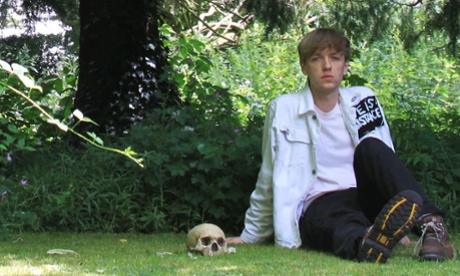From the beginning, Jack Latham was determined that the politics of his second album as Jam City would not pass people by. A short polemic written by the 26-year-old to announce Dream a Garden begins: “No hope, no future, a constant war raging in the peripheries,” and January’s video for Unhappy was a gothic agitprop collage of HSBC slogans, aspirational adverts, fires on the high street and Latham declaiming – in a denim jacket bearing the slogan “Class War”, no less – his main theme: that capitalism is making us miserable. It is unmissable also in the lyrics to Crisis, a paean to the 2011 riots, where a London of burnt-out cars, “black batons under the stars” and spitting at Foxton’s estate agents signs is juxtaposed with the redemptive power of love, solidarity and resistance.
With surprising speed after its 2011 release, Latham’s debut album Classical Curves began attracting that reverential label, “influential” – even, in its short life, “masterpiece”. Its industrial minimalism and jagged rhythms drew stylistically on underground house and grime, a backdrop on which sat some of the sculpted synths of 80s disco and vogue. Before Classical Curves was even ready for release, let alone spawning an army of bedroom producer imitators, Latham was contemplating his next move: how to bridge the gap between the disastrous politics of the world around him and his music-making (perhaps reflecting his art school background, he refers to this as “my practice”).
He talks with incredible zeal and fluency – only halting occasionally to work through an idea in his head, before delivering a series of multilayered thoughts on the chains that connect youth culture to political resistance, to the UK club scene, to the music he loves. Dream a Garden came about naturally, he says, without any deliberate calculation, emerging from his growing fixation on how music – or art more generally – can help provide some small resistance to the perils of late capitalism. There was too much of a disconnect, he says, and he wanted to know why “that general feeling of alienation isn’t audible in our immediate culture and surroundings. I kept thinking about the songs we all listen to, to get us through the day, the songs that give us life for three minutes – you realise how powerful that actually is. It’s incredibly hard to keep going if you struggle with feelings of alienation, or depression – you have to use everything you can to fight that. So why not make your practice that? I know people who are activists, the people who do the real work, but music is not above being a source of resistance. The music I’ve loved has always been that, it’s always talked about alienation and transgressing those feelings.”
This new, almost missionary project has seen Latham make a fairly radical musical departure from the cold minimalism of Classical Curves; for one thing, for the first time that means singing, and learning to love his own voice and its imperfections. Part of his generation’s sense of loss, he says, is not having the spaces to experiment, and to fail, spaces “where there wasn’t such a pressure put on – where you could have bands forming where people weren’t afraid to use their voices. They didn’t feel alienated enough from their own voices and their own bodies to just embrace it. Because we live in such a beauty-obsessed society, and that has trickled down even to aspects of what I would still try and call ‘the underground’ – although that’s a massively contested term. And that makes it even more important to say look man, this is a place for freaks. I got into music because I didn’t feel like I fitted in anywhere in the world, and I don’t want to forget that.”
Dream a Garden is not freakish, but it is certainly a sound as striking and unique as Classical Curves was, in its way – Latham tips a nod to a pleasingly wide range of musical outsiders, from Curtis Mayfield to the Cure, “lots of gothy stuff”, to rappers UGK and some of the weirder strains of 90s and early noughties hip-hop production. He grabs a laptop and pulls up a bizarre, slow, west-coast G-funk track by late rapper The Jacka, which incorporates parts of At the Drive-In’s One Armed Scissor, as an example of his fixation on swollen guitar samples. “It’s a comfort thing I think,” he says, “there’s a very underwatery guitar flange sound, that just feels like home to me.” And yet, for all that Latham has surprised some of his peers by producing an album of more conventional songs, with guitar, bass, keyboard and lyrics, something still tugs him and Dream a Garden back to the dancefloor. “I got a musical education going to clubs,” he says. “And this record, although it isn’t necessarily as immediately playable in a club as some other things I’ve done, I’m now seeing how rooted it is in that experience. The way the vocals are processed on the record, quite low in the mix, that conditioning of your ears to hearing things in passing in the club – it conditions you to want certain things, for things to be more textural, and more intangible, than if you’ve come from a standard singer-songwriter model, just instrument and voice.”
To Latham, the inherent politics of dancing, raving, clubbing – whatever you call it – are blindingly obvious. “If you take a long view of history, there’s always been a kind of transgressive politics to dance music – disco, dub, reggae, rave, grime – but it’s funny, someone said to me in an interview the other day, ‘People don’t normally associate club music with politics.’ I was like, ‘Are you kidding me?!’ It’s never not been political! But somehow, in the last five years or something, in correlation to a lot of political things that have been going on, specifically in this country, it has kind of become an island, a little bit.” So you’re not concerned by the cultural gatekeepers who keep saying political music isn’t what it was in the 80s? He laughs. “It’s not! It’s not the 80s! The 80s are done and dusted.”
“People say about this generation that it’s the apathetic generation or whatever, but I think we’re probably more educated about a lot of things than ever, people are plugged in, and they know what’s going on. But the exhaustion is still there. It’s hard to know how to find a language to talk about these things. I don’t understand mainstream party politics, I never have, it doesn’t speak a language to me that I’ve ever felt I could relate to, and I’m sure it’s probably the same for most people.” And yet he has found a language, and as a political lyricist he is refreshingly natural and unconventional, his heavily filtered voice plaintively singing short lines about riots, body image, the sadness and solipsism of consumer culture, “porn and Adderall”, and the yearning to reconnect, and to feel again.
For Latham, hope lies in other people, strangers meeting (or not meeting) in some of the cultural spaces that are themselves falling victim to contemporary capitalism; he cites a spate of club closures in London, the gentrification of others, and also, in light of the cost of tuition fees, “being able to afford to study; and meeting people, and forming a band, or starting a club night. It’s like the internet’s all we have, and none of us really have any money, so of course that’s the way that we organise and seek comfort from other people. But the doors to do that in real life, that historically have made other movements possible, just seem quite closed to our generation. We need those places and spaces where we can celebrate, because it’s a coping mechanism.”
“We have to deal with the complete privatisation of every aspect of our lives, and I just really believe there should be a physical space where we can go for six or seven hours to reorientate ourselves, actually be fucking humans again, and dance, and hear things that make us feel good inside.”
- Dream a Garden is out now on Night Slugs. Jam City plays the ICA, London, on 5 June.








